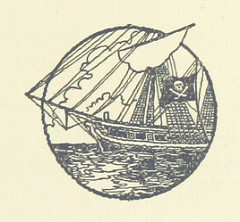In Mary Cholmondley’s 1893 novel Diana Tempest (vol I, vol II, vol III), our eponymous heroine has the doubtful pleasure of encountering a recently married friend, Madeleine Verelst, at a gathering at the home of Lord and Lady Hemsworth. As is typical for this book, which is characterised by incisive and bleakly funny observations of…
Category: Insult of the Week
Insult of the Week: You flaming floundering fool
Please excuse our lack of blogging lately! We’ve had a remarkable number of back-to-back deadlines in the last couple of weeks, and are currently knee-deep in an exciting new project that’s due out before Christmas. (I can’t give full details yet, but watch this space!) On a perhaps-not-entirely-unrelated note, our insult this week comes from…
Insult of the Week: he talked mere drivel
The preacher in residence at St. Hilda’s Church in Donegal, Mr. Vivian, gets a poor review from Charlotte Riddell in her 1888 novel The Nun’s Curse. Although his good qualities are many, and he does excellent work with the sinful and/or suffering members of his parish, his preaching abilities are, frankly, nil. Unlearned, unlettered, uncultured…
Insult of the Week: “…these bungling imitators”
In Chapter 11 of Maria Edgeworth’s Ennui, the narrator and Lady Geraldine go for a leisurely stroll around the ornamental buildings in the grounds at Ormsby Villa. On their travels, they happen upon Mrs. O’Connor, Lady Kilrush and “a troop of hoyden young ladies” and are promptly invited to view “a poetical inscription of Lady Kilrush’s,…
Insult of the Week: your desultory vivacity makes your presence a fatigue
In chapter 29 of Middlemarch, a letter from Mr. Casaubon’s cousin Will Ladislaw sparks off an argument between the elderly clergyman and his much younger wife, Dorothea: “You can, if you please, read the letter,” said Mr. Casaubon, severely pointing to it with his pen, and not looking at her. “But I may as well…
Insult of the Week: Fops
From one gendered insult to another: this week we’re looking at literary fops, or gentlemen that are – in some way or another – a bit too concerned with manners of dress, elegance and fashion. Our featured image (by the wonderful C. E. Brock) comes from John Galt’s 1821 novel The Annals of the Parish…
Insult of the Week: “the big slobbering washing-pot head of him”
In chapter two of Joyce’s A Portrait of the Artist as a Young Man (1916), Cranly and Stephen discuss the latter’s plans for the future. During their exchange, Cranly recalls Stephen’s wrangling with a school acquaintance about the shortest way from the Sallygap to Larras. A voice spoke softly to Stephen’s lonely heart, bidding him go and telling him that…
Insult of the Week: may his head rot off
In chapter 15 of Bleak House, the narrator Esther Summerson and her guardian Mr. Jarndcye encounter Mr. Gridley, a passionate man from Shropshire, who is embroiled in a labyrinthine court case that has permanently soured his view of the legal system. Although Esther (who is herself a ward in Chancery) and Mr. Jarndyce have not,…
Insult of the Week: inferior poets are absolutely fascinating
Ah, poetry. One of the great literary forms, with a history stretching back as far as the earliest written word! Beloved genre of such giants as Sappho, Homer, Chaucer, and the anonymous author of The Poetic Works of a Weird (1827). Being writers themselves, surely our novelists must have a healthy respect for the poetical…
Insult of the Week: A “stiff-necked, arrogant imbecile, pig-headed numskull”
This week’s insult is brought to you by Charles Dickens’ Bleak House. During an ongoing feud between Mr Lawrence Boythorn and Sir Leicester Dedlock over “the green pathway by the old parsonage-house” (that neither man actually seems to want), Boythorn explains their exchanges on the subject “The fellow, by his agent, or secretary, or somebody,…
Insult of the week: a crop-eared English Whig
In chapter 11, we find young Englishman Edward Waverley enjoying – or trying to enjoy – a convivial evening with his host, Baron Bradwardine, and three other Scottish companions: bailiff Duncan MacWheeble, and the pugnacious young lairds of Balmawhapple and Killancureit. Prodigious quantities of drink are consumed, and Waverley manfully does his best to keep…
Insult of the Week: an ass and her panniers
The terminally bored aristocrat Lady Delacour, of Maria Edgeworth’s 1800 novel Belinda, declares in chapter 4 that the only reason she has made it through the last few years is her cherished enmity with her foewoman, Mrs. Luttridge: I cannot count the number of extravagant things I have done on purpose to eclipse her. We…
